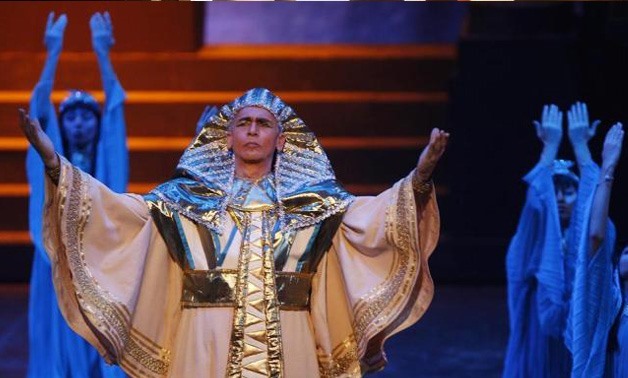
A performance of Aida at the Cairo Opera House in 2009© AMR DALSH / REUTERS
CAIRO – 13 February 2018: Although “Aida”, the renowned opera by French romantic opera composer Giuseppe Verdi , is based on a love story that took place in the Egyptian Pharaonic era, it successfully attracted opera fans all over the world.
Egypt Today breaks down this attraction into three major values – human, artistic and historical –presenting to you why the international opera community sanctifies this opera specifically.
As the Khedive of Egypt was a great lover of European culture, he decided to produce an opera commemorating the inauguration of both the Suez Canal and the Cairo Opera House. He then asked French Egyptologist Auguste Mariette to write this opera’s script based on intense research of Egypt’s ancient history.
There is a popular belief that, at the beginning, Verdi refused the Khedive’s offered commission to compose “Aida”. It is also believed that he changed his mind after knowing that the Khedive had decided to offer that commission to another composer, according to San Francisco Opera Association’s official website.
Verdi is Italian composer and wrote his first opera, “Oberto”, which premiered at La Scala in Milan and was well established. During this period known as his “galley years”, Verdi created most of his remarkable works, such as “Rigoletto” (1851), “Il Trovatore” (1853) and “La Traviata” (1853), which remain remarkable pieces of opera history today.
He ended his artistic journey by composing two plays by Shakespeare – “Otello” (1887) and “Falstaff” (1893) – which successfully premiered, leaving a significant print in international opera history.
The human value
“Aida” shows how love can be forbidden when the beautiful Ethiopian princess Aida gets stuck between her love for the Egyptian leader Radames and between her love for her father and country. The Egyptian king’s daughter, who also loves Radames, imprisons Aida to be her slave. Led by Aida’a father, Egypt’s Ethiopian enemies head to invade the country, which led to the father’s imprisonment to meet his daughter in prison. According the Aida’s father’s demand, Radames leaks a military secret, which led to his burial while still alive. Finally, he gets surprised by finding Aida in the tomb to wait for their death together.
Through a portrait of brutal war between love and duty, Verdi explores the different aspects of a work in which individuals’ destinies are being shaped. It may seem that, in this opera masterpiece, Egypt’s history is the only major target to be personified. Verdi infuses the main characters with a pitiful humanity, highlighting many human factors, such as passions, forced destinies , gods, ego and bad luck.
The artistic value
By premiering first in Milan specifically and by choosing the right voices, Verdi succeeded in exploring emotions in depth through his convincing music. Studying Egypt’s history, music and geography, Verdi composed varied Egyptian melodies harmonically, which was clear in the opening of the third act with the Nile scene. The composer had developed an extraordinarily clever ear for orchestral effects and theatrical atmosphere.
Historical and political value
Although “Aida” portrays a significant stage in Egypt’s history, Verdi was very much affected by the political change in Italy, in which nationalists were fighting to unify the country. Verdi was known for reflecting the political instabilities all over the world in his operas, becoming the “Composer of the Revolution”. Also at the time of “Aida”, Napoleon III affirmed the war on the German kingdom, which led to the loss of the regions of Alsace and Lorraine.
After premiering in Egypt and Milan, “Aida” premiered in many countries starting from 1873, such as Argentina, United States, Germany, Spain, Austria and Poland, among numerous other countries.

Comments
Leave a Comment